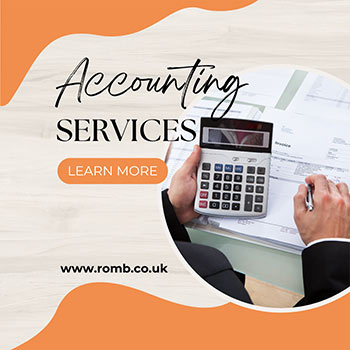
When most people think of accountants, the first thing that comes to mind is taxes. While filing taxes is a key responsibility, the role of an accountant goes far beyond filling out financial forms once a year. Whether you're a self-employed tradesperson, a young couple redecorating your home, or a professional designer managing large-scale residential projects, understanding the role of an accountant can make your life easier—and your finances healthier.
From managing business expenditures to ensuring your bookkeeping is accurate and up to date, accountants play a crucial role in keeping individuals and businesses on firm financial footing. In today’s economy, where every penny counts and time is a precious resource, an accountant’s expertise can bring both clarity and strategy to your financial world.
Let's dive into what accountants really do, how they support a wide range of professionals, and why their role is essential for financial success at every level—from sole traders to established businesses and busy homeowners.
1. Keeping Your Financial Records Organised
At the core of an accountant’s role is maintaining clear and structured financial records. Whether you're a professional tradesman handling multiple jobs a week or a small design studio managing several interior design projects, accurate bookkeeping is the foundation of sustainable growth.
Accountants record financial transactions, categorising expenses and income to generate useful reports. This might involve tracking client payments, managing supplier invoices, or even ensuring payroll is accurately completed for employees or subcontractors.
For home renovators and DIY enthusiasts operating on a tight budget, accountants can help you stay on track by giving you visibility into where your money is going each month. With well-structured reports and consistent record-keeping, you’re in a much better position to prevent costly mistakes and take advantage of savings where possible.
Neglecting financial organisation can lead to lost receipts, missed tax deductions, or even penalties from HMRC. An accountant's ability to keep your financial data accurate and up-to-date is not just helpful—it's legally essential.
2. Handling Tax Responsibilities—The Smarter Way
Whether you're filing a self-assessment return for your freelance designer income, managing VAT for your building company, or seeking advice on capital gains after selling a buy-to-let flat, taxes can be overwhelming. That’s where accountants become indispensable.
Accountants ensure you're compliant with UK tax laws. But their role isn’t just about doing the paperwork—they also help you maximise your eligible tax reliefs and save money in the process.
For example, did you know that self-employed tradespeople can claim back expenses for tools, travel, and even part of their home utility bills if they have a dedicated workspace? A qualified accountant will ensure you're claiming everything you're entitled to—without crossing legal boundaries.
Working with an accountant means fewer unpleasant surprises during tax season, no stress with HMRC correspondence, and no worry about missing key deadlines like the Self Assessment tax return (31st January) or VAT returns (usually quarterly).
3. Helping With Financial Planning and Strategy
Accountants are not just financial historians—they’re strategic advisors. Hiring an accountant means you’re not just looking back at what’s been spent, but planning more intelligently for what’s ahead.
Let’s say you’re a young architect planning to branch out and offer your services independently. An accountant can advise on the best structure for your business—should you be a sole trader, form a limited company or enter a partnership? Each has different financial and legal implications.
If you're redecorating your home and trying to budget effectively across multiple rooms or tradespeople, an accountant can help create a realistic home improvement budget and show you how to manage your cash flow month to month.
They can also spot trends and opportunities in your financial data, recommending when is the best time to invest in assets or reduce overheads. It’s like having a financial sat nav, guiding you toward smarter decisions and long-term goals.
4. Supporting Growing Businesses
Growth brings complexity. For tradespeople taking on larger contracts, design consultants expanding their teams, or DIY enthusiasts starting a home renovation business, financial needs quickly escalate.
An accountant will help you understand the real-time health of your business through reports like profit and loss statements, cash flow forecasts and budget analyses. These reports aren't just useful—they're essential for avoiding overspending, unsustainable growth, or mismanaging debt.
They also assist in securing financing. Want to get a business loan or line of credit for new tools, a van or stock? Banks often require well-organised financial statements before approving funding. An accountant will ensure your figures are accurate and confidence-inspiring to lenders.
In essence, a qualified accountant plays a critical role in helping you scale sustainably, avoid common pitfalls, and meet your legal obligations while staying focused on your core talents and clients.
5. Saving You Time and Headaches
If you’re like most professionals, your time is already spread thin. Running a small business or managing a major renovation means putting in long hours. The last thing you need is to be buried under invoices, expense tracking, and late-night reconciliations.
Hiring an accountant means handing off many time-consuming but essential tasks to someone who knows how to do them fast and right the first time.
They also use tools and software to make the process even smoother. From cloud-based platforms like Xero and QuickBooks to MTD (Making Tax Digital) compliance tools, accountants streamline your workflow and ensure your financial systems are future-proof.
More than simple convenience, delegating your financial tasks to a professional means peace of mind—and more time to do what you love, whether that’s crafting bespoke interiors or building a name for your renovation business.
6. Overview: Common Services Provided by Accountants
| Service | Description | Who Benefits |
|---|---|---|
| Bookkeeping | Regular recording of income, expenses, assets and liabilities | Tradespeople, freelancers, small business owners |
| Tax Filing | Preparing and submitting tax returns to HMRC | Self-employed, landlords, company directors |
| Payroll Management | Calculating and processing staff wages and PAYE | SMEs, construction firms, interior design studios |
| Financial Reports | Providing P&L, balance sheet, and cash flow analysis | Growing businesses, start-ups, architects |
| Business Formation Advice | Assistance with choosing business structure and legal setup | New entrepreneurs, design consultants, tradesmen going solo |
| HMRC Liaison | Communicating with HMRC regarding audits, enquiries or disputes | Anyone needing tax support or resolving compliance issues |
Conclusion: Why Every UK Professional Should Have an Accountant
Whether you’re a budding interior designer, a hardworking self-employed plumber, or a family making strategic updates to your home, financial clarity is essential. An accountant doesn't just show you where your money goes—they empower you to use it better.
In the UK, where tax rules evolve, home ownership is costly, and small business margins can be tight, having a financial expert by your side is more than a good idea—it's a competitive advantage.
And while it might feel like a luxury at first, hiring an accountant frequently pays for itself in the form of tax savings, financial insights, and peace of mind. No matter how big or small your goals, with the right support, you're far more likely to reach them—and avoid costly pitfalls along the way.
So whether you're planning your next big project, scaling your business, or simply trying to handle your income and expenses smarter, don't underestimate the value of an experienced accountant. It might just be the investment that secures your financial success for years to come.






